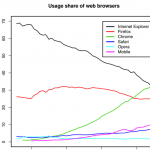 I am a Mac. It pains me to look at this data, but the data is accurate, statistically relevant, and conclusive. The Explorer browser is faster than Firefox, with more features.
I am a Mac. It pains me to look at this data, but the data is accurate, statistically relevant, and conclusive. The Explorer browser is faster than Firefox, with more features.
I do not exactly know where Explorer lost its reputation as the internet browser of choice. Like most preferences, it likely happened gradually as consumers were attracted to shiny new objects. I must admit that there was a time when I flocked to any new browser that I could get my hands on… ergo, my tender relationship with Opera and the socially networked browser called RockMelt.
Frequently, software is measured for quality in terms of features, not speed. If you think of an MLS system, your IDX search, your website, your accounting software, etc. These products are selected on the basis of what they do more than how fast they do them. But browsers are different. When you ask consumers, or family and friends why they use a particular browser, they are unlikely to tell you reasons such as the quality of spell check, parental controls, mouse gestures. They always say “because its faster.” Nevertheless – Internet Explorer is among the top feature-rich browsers on the planet. If you want to see a side by side comparison, do as I did, and do a search for Internet Browsers. The page I liked the most is http://internet-browser-review.toptenreviews.com.
As a side note, during MLS vendor selections, user groups also remark that speed is among their most important features, especially in large markets where you have many concurrent users and large listing databases.
In looking at the features of browsers, I tend to measure each feature in terms of importance. You will notice that Internet Explorer is the only browser to offer email and telephone support. To me, that is very important when you run your business using the browser-based software. In fact, MAC lovers will note that Safari is among the browsers with the worst feature set – especially for security features like Anti-Phishing. Indeed, the only reason why Safari was considered a better browser for security was that nefarious people looked at the size of the consumer audience and ignored it. Too small to attack. But this is changing, and it is not good. Evil-doers are now looking at the $2000 Mac buyer vs. $500 PC buyer and redirecting their efforts.
Features aside, this article is about speed. WAV Group has the luxury of having access to the behavior of 1 million visits to RE Technology each month understand real estate agent behavior. Most sites I checked for PC vs. Mac market share has Mac at about 10% of the market. In real estate, there is an abnormal bias toward PCs that skew the average because many real estate specific software applications like MLS systems are not fully cross-browser compliant. With home buyers, the number of Mac users seems to skew above the national average. I guess that if you can afford to buy a home, you can afford to buy a Mac (fewer students and kids searching for homes).
According to RE Technology – pages load in 1.76 seconds on IE browsers, and 3.27 on Firefox or Chrome. The sample set was too small to look at Safari. To be fair, I looked at a few broker websites to see how consumer performance may vary against business to business websites.
Interestingly enough, you do find some variable data here. Internet Explorer is indeed slower than Chrome, but about even with Firefox. Safari is an absolute dog. Please note – this data does not include mobile browsers. It is very interesting to note that Safari has almost equal page views as Internet Explorer among home buyers.
Here is another broker website. Google Analytics sometimes fails to record data for some reason. I guess that free tools like Google Analytics are nice, but not as accurate as you might expect. I am not sure if the Safari page load time is unable to track because of the website code or because of an issue with Analytics itself. It is interesting to note that this west coast broker actually has more Mac traffic than PC traffic. But this solidifies my point that Firefox is Uber Slow. Chrome has a slight edge.
The moral of the story is to use Internet Explorer if you run a PC. If you want a shiny new secondary browser, use Chrome. If you attend or host webinar events, you will notice that Chrome will often has issues with the newest versions of Java that enable secure session based screen sharing. Chrome for Mac typically throws up an error code that says that Chrome is a 16 bit browser and a 64 bit browser is required.








As the world moves to tablets, the irrelevancy of IE will accelerate. The MLS organizations better be optimizing for mobile, iOS in particular if they want to remain relevant.